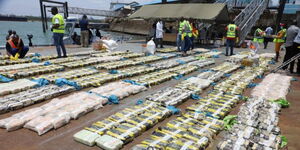Martin Chomba, the Chairman of the Petroleum Outlets Association of Kenya (POAK), on Thursday, May 10, warned of a looming crisis if the proposed tax increments take effect.
Chomba argued that with the new proposal, the fuel cost may increase by Ksh12, bringing the total cost to about Ksh191 per litre for Petrol.
"At this point, the question is whether or not filling stations will close down, but a matter of when," the chairman argued.
He further suggested that if the government was keen on collecting more taxes, it should increase the tax bracket rather than taxing basic commodities.
In the proposed Finance Bill 2023, the VAT on fuel will double from 8 per cent to 16 per cent.
The chairman, alongside other members of the association, urged members of parliament to reject the bill as Kenyans may dig deeper to cover the extra costs.
In 2018, former President Uhuru Kenyatta reduced the VAT on fuel to 8 per cent to ease the heavy financial burden on Kenyans.
Some taxes imposed on petroleum products include road maintenance levy, excise tax, petroleum development levy, petroleum regulatory levy, railway development levy rate, anti-adulteration levy, and merchant shipping levy.
The bill tabled before the National Assembly on May 4 aimed to increase the taxes collected by the government to ensure development projects in the country continue uninterrupted.
Since it was unveiled, Kenyans and other politicians rejected the proposals considering the tough economic times.
However, Treasury Cabinet Secretary (CS), Njuguna Ndung'u, defended the proposal adding that there was a need to do away with multiple VAT rates in the country.
"The objective of the bill is to ensure uniformity of how we tax commodities," the CS stated.
Currently, motorists in Nairobi pay Ksh179.30 for a litre of super petrol, Ksh162 for diesel, and ksh145.94 per litre. The Energy and Petroleum Regulatory Authority (EPRA) is expected to announce new fuel prices on Sunday, May 14.












